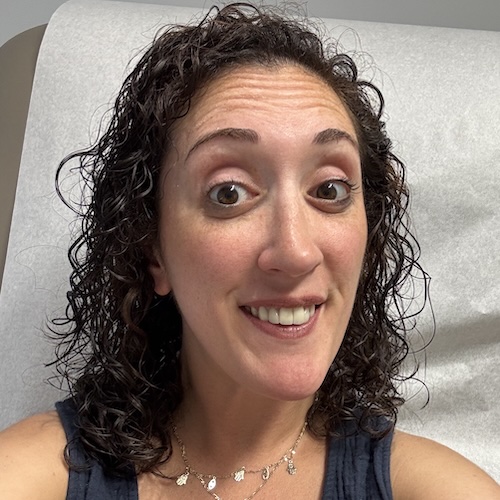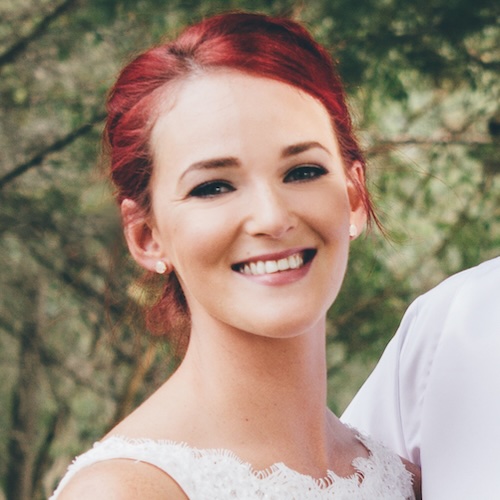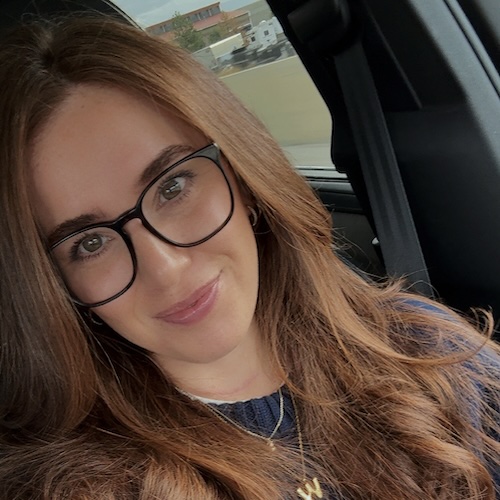Jenna’s Stage 2 Metastatic Papillary Thyroid Cancer Story
Jenna shares her stage 2 papillary thyroid cancer story and undergoing a thyroidectomy, taking hormone replacement therapy (Synthroid), and radioactive iodine treatment.
In her story below, Jenna highlights navigating life with cancer, including dealing with guilt for having a so-called “good cancer” and being an adolescent young adult (AYA) cancer patient. Thanks, Jenna!
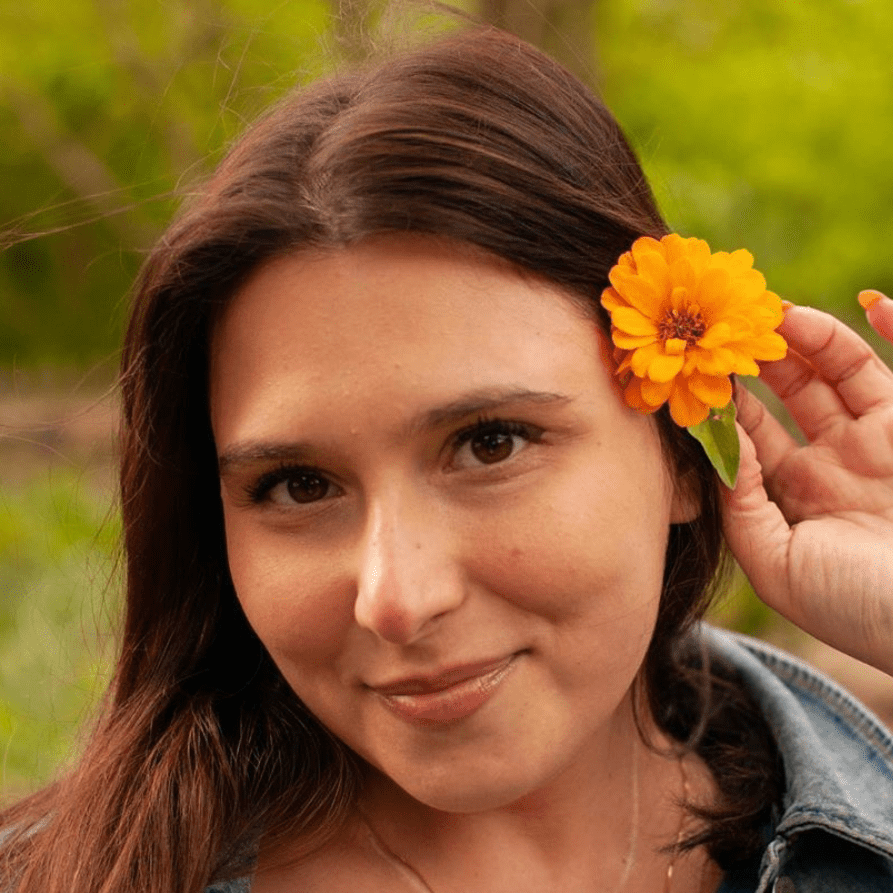
- Name: Jenna C.
- Location: Staten Island, New York
- Diagnosis:
- Papillary thyroid cancer
- Metastatic (spread to lymph nodes)
- Stage 2
- January 2018
- 1st Symptoms
- Sore throat, painful when speaking
- Lump on one side of neck
- Pre-treatment Tests
- Ultrasound
- Fine needle aspiration (FNA)
- Treatment
- Total Thyroidectomy
- Surgical removal of entire thyroid
- Synthroid (hormone replacement therapy)
- Radioactive iodine treatment
- Total Thyroidectomy
- Special focus:
- Self-advocacy
- AdolescentYoung Adult (AYA) Cancer Patient
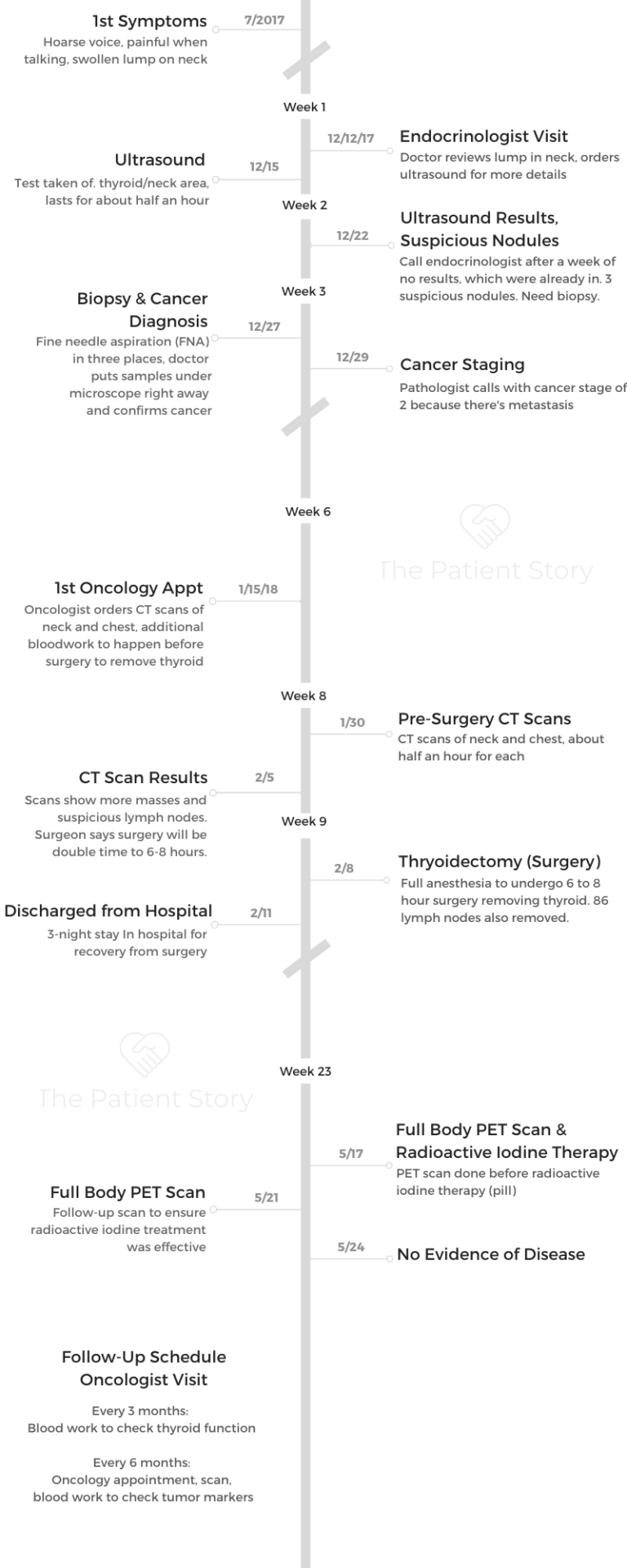
- First Symptoms
- Scans and Tests
- Describe the ultrasound process
- How long does it take to get the ultrasound results
- Why did you have to call the doctor to get the ultrasound results
- Describe the prep for the biopsy
- Ways to make the biopsy appointment better
- How would you rate the pain of the biopsy (1=lowest, 10=highest)
- Describe the fine needle aspiration
- The results of the biopsy
- Diagnosis and Treatment Plan
- Describe the thyroid cancer diagnosis
- How do you process the news of a cancer diagnosis
- What was the cancer stage
- How do you decide where to go for medical treatment (surgery)
- Having someone else set up appointments is helpful
- How were the weeks waiting for your oncology appointment
- Advice to people on how to pass the time
- Describe meeting your oncologist for the first time
- Discussing the treatment timeline
- What is the treatment plan for your thyroid cancer
- Describe the CT scans
- Why two separate CT scans
- Describe the call when you got your CT scan results
- What was the updated treatment plan
- Surgery and Recovery
- What testing do they do before the surgery
- What happens with an EKG
- Describe the “drains” that would have to be put in your neck
- Describe the prep for the surgery
- What are the results of your surgery
- Waking up from surgery
- Describe the pain and physical adjustments during the immediate recovery
- When are you discharged from the hospital
- Describe the drains and the removal
- Anything you wish you had known about drains
- How long did it take for you to physically recover
- Synthroid (Hormone Replacement)
- Radioactive Iodine Therapy
- Follow-Up Scans
- Mental and Emotional Impacts of Cancer
This interview has been edited for clarity. This is not medical advice. Please consult with your healthcare provider for treatment decisions.
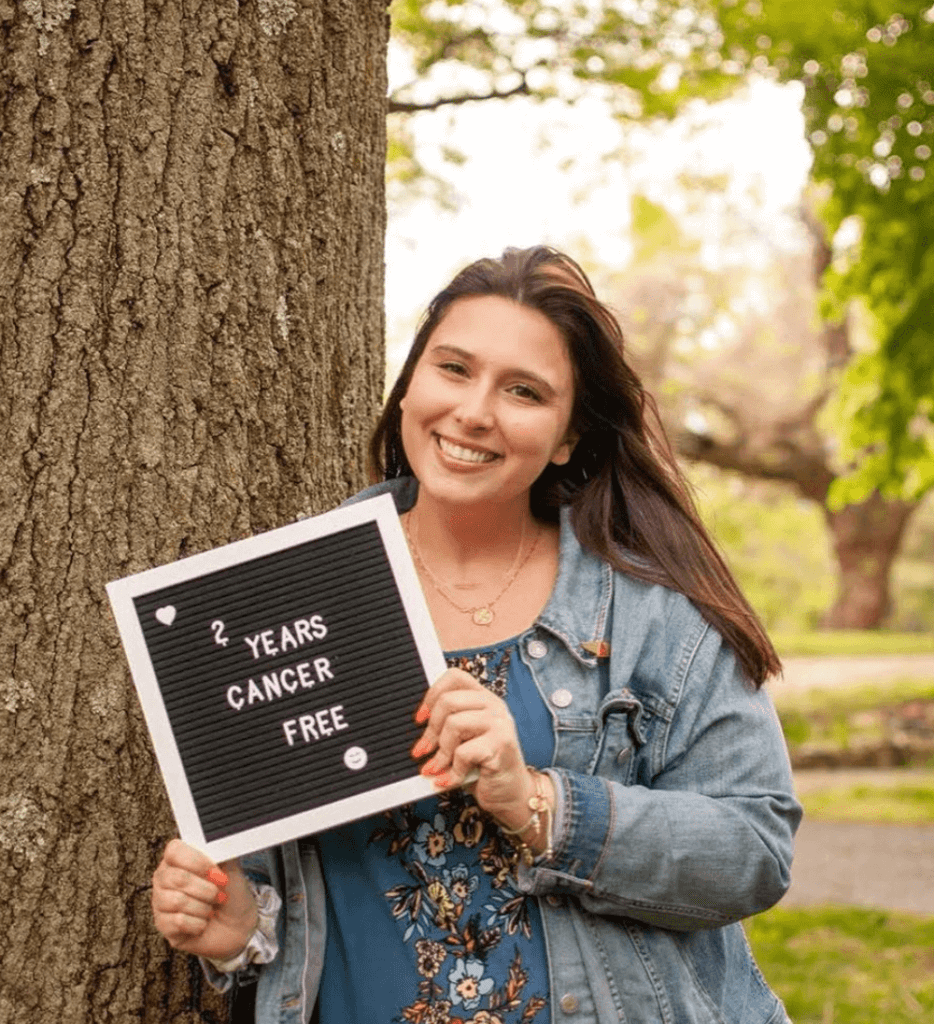
You need to nurture yourself, take care of yourself mentally, just as much as you would physically. It’s adjusting to a new life and trying to find people that have been through the same thing as you.
Just knowing that you’re not alone.
Jenna C.
First Symptoms
What were the first symptoms
About six months before I found out I had cancer, one of my main symptoms was my voice was extremely hoarse. Not the kind of hoarse when you wake up, feel a little groggy, and have to clear your throat. I would speak and my voice would go in and out. It would actually sometimes really hurt to talk.
Another really alarming symptom I had was I had a lymph node on one side of my neck that was protruding out of my skin. I would constantly shake it off because a few times when I was younger I had mono.
I had thought it was just a little flare-up of mono, that it was really not a big deal just because I was always on the go. I worked a lot. Always hanging out with friends, commuting back and forth from Manhattan.
So I shrugged it off until one time I had said to myself, I have thyroid problems in my family. Not necessarily cancer, but hypothyroidism, Grave’s disease, so I said to myself I might as well just get this all checked out. That’s what led me to go to the doctor.
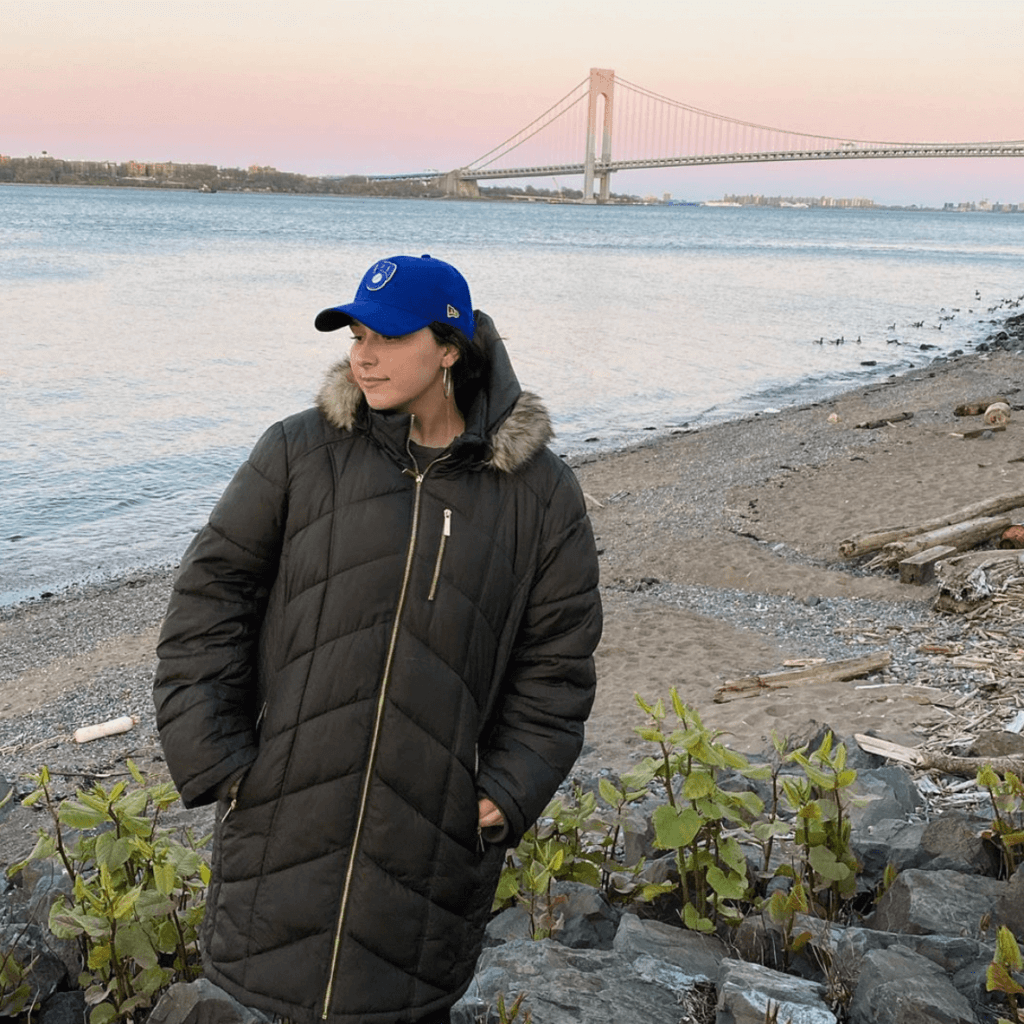
How long did you feel those symptoms before seeking medical care
I felt those symptoms for about six months but it was in the last two when I really started to get nervous because I would feel a lymph node in my neck and go, oh I don’t think that’s supposed to be as big as it is right now. So let’s go get that checked out.
What happens at the first doctor’s visit
My first trip to the doctor I wasn’t very nervous because I have thyroid problems in my family. My mom has an under-active thyroid so she coached me through the whole thing.
She said you’re going to go to the endocrinologist, they’re going to do this, this, and that. This was her doctor that I had [gone] to. I went in very confident, just thinking there’s something wrong with my thyroid because I was also gaining weight a little bit.
When I went in, I was fine. I gave them the insurance card, my co-pay, was reading a book waiting. Even the doctor who had examined me said your thyroid is a little enlarged, I wouldn’t say it’s anything, but I want you to go get a sonogram just in case.
So I’m still confident because it had happened to my mom. It happened to a cousin of mine where they went and got these sonograms and it was nothing, everything was benign. I was pretty happy-go-lucky going into it.
Scans and Tests
Describe the ultrasound process
I went to the doctor on December 12 and went for the [ultrasound] that Thursday. That was two days apart. I went super early in the morning before I went to work.
I thought that maybe the ultrasound tech wasn’t in a good mood but her face was just very alarming the whole time. It’s 7am, maybe she’s tired, not really thinking that it was anything serious which it turned out to be.
It was painless, just sticky because they use all that gel to move the wand instrument across the area that they’re looking at.
It definitely felt longer than it actually was because I’m thinking to myself I have to get this over with, I have to get to work, I want to get on the bus, I want to get into Manhattan.
But I would say from start to finish it was about 25 minutes. Again, I’m looking at the screen and I don’t know what I’m looking at. I wasn’t very worried but at the same time I was just a little confused about what was going on. I had never had an ultrasound, let alone on my neck area.
How long does it take to get the ultrasound results
Funny story. I had called my doctor that ordered the test on December 22. I left a message for him. I said, “I know it’s right around the holidays but I’d really like to know the results of my ultrasound just to put my mind at ease.”
At this point, I had started looking up “lymph node in neck” and “hoarse voice,” so I was really starting to freak myself out on what it could be.
I stopped the no news is good news thing, so I said let me just give him a call and I left a message. He had called me back about two hours later.
I was at a park in Manhattan when my endocrinologist called me and told me, “The ultrasound came back a little bit suspicious. You have about two or three nodules on your thyroid that I need to get biopsied. 95-percent of the time these nodules come out benign so I really am not worried for you.”
Naturally, I’m freaking out because I’ve never had a biopsy before.
Because the holidays were coming up with Christmas, the endocrinologist said I would have to wait till after the holiday. So I’m freaking out. I couldn’t really enjoy my Christmas because of it.
There are much worse things in life, I know, but at the time you’re like it’s Christmas. I’m so bummed thinking about having to get a biopsy two days later.
Why did you have to call the doctor to get the ultrasound results
I don’t want to say anything bad. He’s not my doctor anymore but there’s unfortunately a stigma around thyroid cancer and issues because it’s not necessarily as deadly as other things, it’s not as important sometimes is the feeling you get in my community. It stinks but it is what it is.
Describe the prep for the biopsy
I had to go to a different doctor. I had to go to someone else that specializes in the fine needle aspiration (FNA). I got that on December 27 so I actually got the appointment fairly quickly considering the time frame, having Christmas Eve and Christmas Day between that. That was great to have that pretty quickly.
The ironic part is when I went to the biopsy with my mom, the first thing we saw in the office was this magazine that had Thyroid Awareness Month which was coming up in January. That’s when I started to get this feeling – okay, there’s too many signs. There’s something that’s wrong here.
I was to get a fine needle biopsy of three spots on my neck. In the middle, the left, and the right. That’s when I had to take the next step of going to get the fine needle biopsy which was actually kind of painful. That was one of the more painful parts that I had to go through.
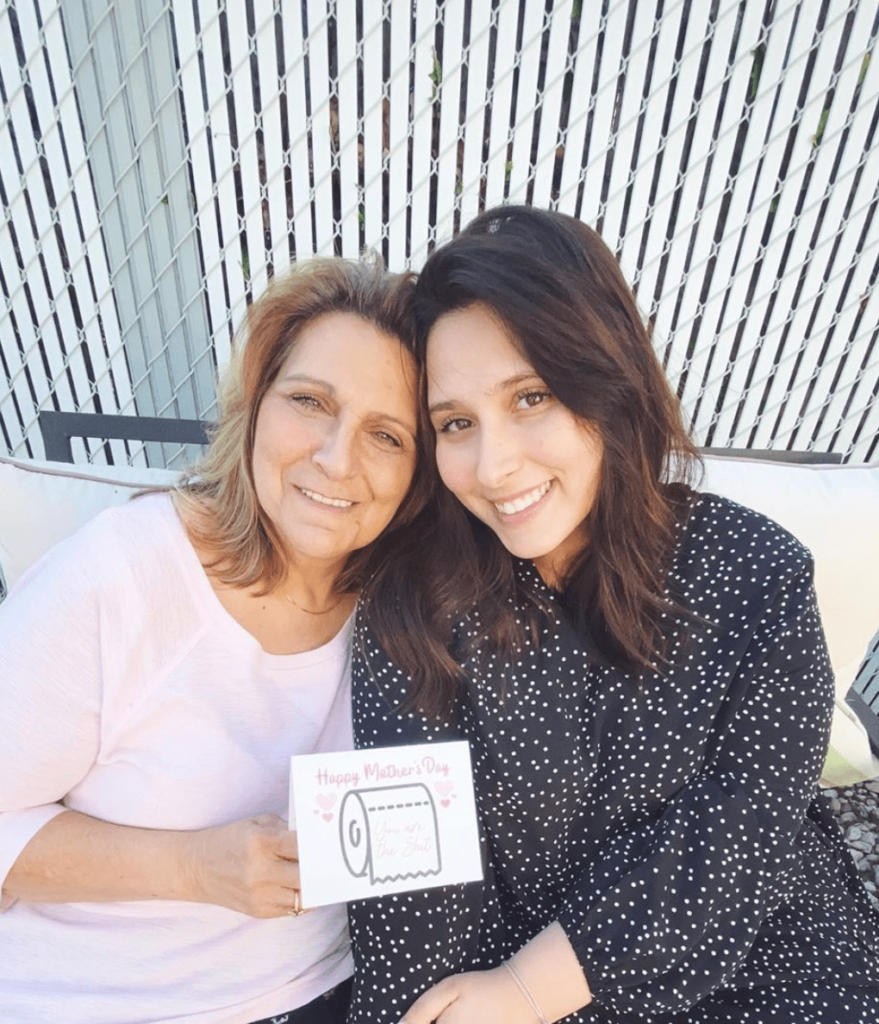
Ways to make the biopsy appointment better
My mom is my best friend. I chose going for the biopsy with my mom over my boyfriend. My mom tried to keep me as calm as possible. I went in fairly quickly.
The attending nurse or the assistant for the [doctor] was very sweet. She had put on music that I requested. She asked me if I liked Taylor Swift, which I do, she’s one of my favorite artists. She had put that on to make me feel a little bit better.
After waiting five minutes, the [doctor] came in. He was excellent. He’s a very thorough doctor to the point where he discarded my old ultrasound results and wanted to take all fresh ones. He wanted to see exactly what he was working with. So he had taken more ultrasound images of my neck. He marked where he was going to stick the needle into.
He told me, “You don’t have one or two nodules on your thyroid, you have about three masses,” which is a much scarier word than nodule.
How would you rate the pain of the biopsy (1=lowest, 10=highest)
6 (1 = not painful, 10 = most painful)
Describe the fine needle aspiration
Next order of business is the biopsy. The needle is very, very long. It’s thin but very long and it’s scary for someone that has never gone through anything medical besides donating blood or getting bloodwork taken. But the doctor’s a very sweet man. He was making jokes while doing the biopsy to make me feel better.
It wasn’t really a true pain, it was more of a pressure.
I don’t know if that’s because that’s how it’s supposed to feel or my neck was very tense. The neck is a very, very temperamental spot depending on whether you feel nervous or tense. It’s going to affect someone working around your neck because of all the muscles and all of the nerves that you have in your neck.
He had biopsied the three spots. It was like bing, bang, boom – left, right, center. And he had gone straight over to an area where he had a magnifier. He had put the slides underneath the magnifier.
The results of the biopsy
Unfortunately, his face kind of gave away that something was wrong which may sometimes come off as unprofessional but I didn’t mind it. It made it a reality of what I was about to go through. I felt at that point they were going to tell me that I had cancer.
Right then and there he told me that I had cancer.
Diagnosis and Treatment Plan
Describe the thyroid cancer diagnosis
He came over to me and held my hand. My mom was behind me holding my shoulder. He said, ‘You have cancer but the good news is you’re not going to die and you still need to wear a seatbelt.’
At that point I’m like what is this man telling me? That I have cancer but I’m not going to die. How can he make me a promise like that just from looking at a slide?
He had said to me with thyroid cancer, again this is the stigma around it, you just have to get your thyroid out. You’re going to be fine. He’s like it’s going to scar you a little bit but at the end of the day you’re going to have your life and you’re going to be fine.
I just want you to know it’s not that easy and that there is a pretty sucky stigma around having the ‘good kind of cancer.’
After that, I wasn’t really crying because I was in so much shock. He said he needed to examine the cells a little bit more to determine if it’s stage 1 or stage 2. He said that stage 3 and 4 don’t really exist in thyroid cancer. He told me right off the bat that I had papillary thyroid cancer.
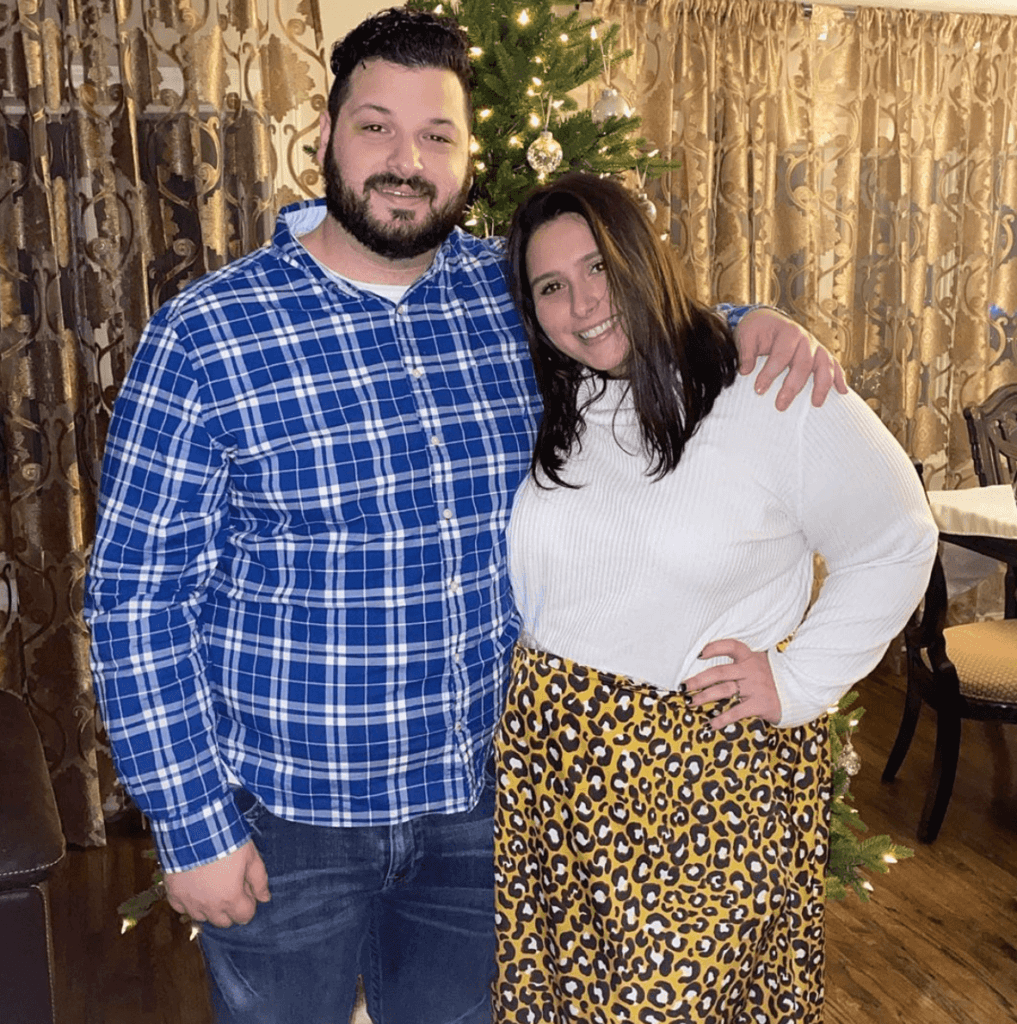
How do you process the news of a cancer diagnosis
I went home. That was kind of a blur: going home, your doctor telling you have cancer but you’re not going to die and two, call me later so I can tell you what stage it was.
It was such casual conversation. It felt like someone punched me in the gut.
I had just turned 24 six weeks before that so I was starting to get my life together, and I’m like okay, pause, we can’t do that right now because I have to deal with this.
So I had gone home and told my siblings that I had cancer. I had called my boyfriend. I remember I drove by myself to the boardwalk by the beach area where I live in Staten Island.
I sat there and finally decided to cry because there was no one else around me. It all felt so surreal.
What was the cancer stage
I called the pathologist and he said to me you have stage 2. He said from the cells, it seems that it spread to a lymph node or two in your neck.
So I’m panicking, why couldn’t I have stage 1? Why couldn’t it just be contained to my thyroid? I knew someone I went to high school with had the same thing and hers was stage 1 so of course, envy comes over my face and I’m pretty much crying all night.
How do you decide where to go for medical treatment (surgery)
Before I got off the phone with the pathologist he said, “I would really recommend that you go to Sloan Kettering.” He had given me the name of a surgeon, Dr. Wong.
I told my mom what he said on the phone and we realized that about five or six months before that in July, my aunt had her thyroid removed. She is a 911 first responder. They had found that she had some pre-cancerous cells on her thyroid that they said let’s take out right away.
We have it now, we know this is 911-related, let’s take this out. She had Dr. Wong. I’m like okay that’s two people who’ve recommended Dr. Wong.
»MORE: Read more patient experiences with surgery
Having someone else set up appointments is helpful
My mom had said to me, ‘I know you’re very independent and 24 years old but let me call Sloan. Let me set up the appointments.’
That was the morning of December 28 which is my boyfriend’s birthday. It was very surreal finding out you have cancer, go to bed, and then wake up and making sure that your boyfriend still has a great birthday because you don’t want anything to ruin it.
While going out to dinner and while celebrating, having your mom be like, ‘Okay, great, I got you an appointment with Dr. Wong on January 15.’
It sounds like a long time but to be able to get an appointment in less than two weeks with a top doctor at Sloan Kettering, I didn’t really mind waiting. I was told I wasn’t going to die.
How were the weeks waiting for your oncology appointment
Those two weeks waiting from when I was initially diagnosed to having my first oncology appointment was probably the longest two weeks of my life.
Advice to people on how to pass the time
Keep busy.
Thankfully, I was employed. Full-time job in Manhattan. The funny part was that I had taken off all of that Christmas break and New Year’s, saying to myself, ‘I’m going to have a great vacation! I have the time off work, it’s going to be great.’
And the entire time off work I was going from doctor’s appointment to doctor’s appointment so it was very ironic that it wasn’t a vacation at all.
The good thing was that in between those two weeks I stuck to my normal routine. I went to work every day, I concentrated on my work. I still hung out with my friends.
Just keeping to a routine is the most important thing because it just keeps your mind off of it. Keeping that routine makes it seem like nothing’s changed.
Nothing’s different. Just keep powering through. So I didn’t change a thing and I think that’s what got me through those two weeks. They felt long but thankfully my head was in the right place.
Describe meeting your oncologist for the first time
It was my first visit with Dr. Wong. My first oncology appointment – it’s so weird being a younger person in a cancer center. Just turned 24. Just came back from Atlantic City celebrating my birthday and now I’m in the head and neck hospital at Sloan after finding out I had cancer.
I brought my mom again to meet Dr. Wong. I had met with his nurse practitioner first, very sweet woman, Jill. She basically asked me a few questions to report to Dr. Wong before he came in.
I kept it together. I didn’t cry in front of her or in front of any of the doctors but in between them coming in and out, I started bursting into tears because I’m one of those people who doesn’t like anyone seeing my upset. I don’t like to show my emotions as much as other people do.
I’m very sarcastic and I like to laugh. So dealing with something like that while trying to keep up my persona and usual attitude so other people don’t see me necessarily weak was another thing that was really trying during that time.
In between the nurse, Jill, and the doctors coming in and out, I would just look at my mom and be like okay, and start bawling, but quickly get it back together when someone was coming in.
I met Dr. Wong, my hero, shortly after I had met with Nurse Jill. He is the best doctor in the world, best surgeon in the world. He basically walked me through it.
He told me first that the pathologist who’d taken the biopsies from me is one of his good colleagues. He recommends him completely.
So that’s when I knew I’m on the right track with all of this. I went to the right person to get the biopsy from, now I’m at the right doctor’s office.
I felt in good hands which was great because I had felt the safest I had in two weeks from my initial diagnosis to my first appointment.
Discussing the treatment timeline
He had told me, “You’re going to have to get a few more tests. We want to assess the entire situation.” So he walked me through you’re going to get a CT scan of your neck, a CT scan of your chest, you’re going to get more blood work. Then he said, “Now we need to set a date for your operation.”
Me, being casual, I say well this date doesn’t work for me, it’s Superbowl Sunday and my godson’s birthday is on Valentine’s day. We were making a joke about it, and he’s like , ‘Okay, you tell me when’s good for you,’ which really made me feel at ease. Just to be able to have a casual conversation about something so serious.
That’s when we had decided on February 8th for my surgery date. I would have to go get those tests done to assess the extent of the disease on January 25th.
I had left the appointment very confidently because I was very comfortable with Dr. Wong. I was a little scared about having to get CT scans and what not because I had never gotten anything like that done before.
Knock no wood, before this, I was never really sick. Don’t get me wrong, I’ve had mono, I’ve had flu, I’ve had illnesses before but not to this extent.
I never had to get an MRI or anything like that. I’m claustrophobic so I’m like how am I going to do this? How am I going to sit still?
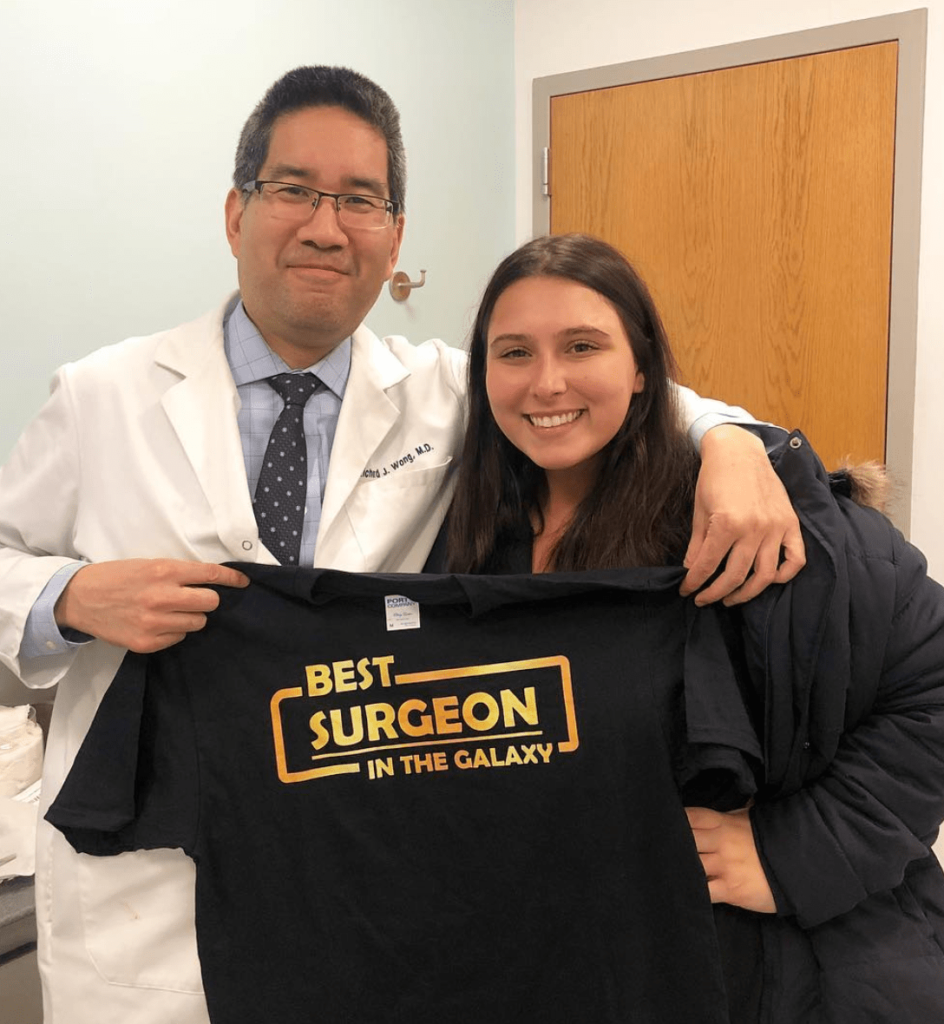
What is the treatment plan for your thyroid cancer
I knew that I wasn’t going to have to get chemo because Dr. Wong had told me right away, “With your kind of thyroid cancer, the most common form of thyroid cancer, we don’t treat with chemotherapy. We treat with radioactive iodine.”
Describe the CT scans
I was all ready to get my CT scans done and I never had contrast before. They said to me, we’re going to put the IV in for your contrast. I thought you drink contrast from past family members getting sick, I remember if they had to get scans, they had to drink some gatorade concoction.
So I was a little freaked out when they put the IV in and put the contrast. They said, “In 5 minutes you might feel like you have to use the restroom but it’s just the contrast going through your body so don’t get nervous.”
Everyone at Sloan is so friendly down to the security and the custodians. Everyone is just so great, they were so friendly. They walked me into the room with the CT machine which is kind of intimidating. It’s a dome and you have to lay down on the “bed.”
I laid down and thought about what the nurse told me, “If you feel like you have to go through the bathroom don’t freak out it’s just the contrast working.” So that was the most bizarre feeling ever.
They put me into the machine, slowly going in, and I’m so nervous at this point. They tell you, “Don’t breathe, don’t move,” because you’re going to mess up your CT results. The longer you don’t comply, the longer you have to be in this thing.
I’m in this CT machine and I’m laughing because I need to use the restroom, but I’m crying because of the situation I’m in. The CT machine is this close to my nose and I’m claustrophobic so I’m like this is so bizarre right now.
Those CTs lasted about 25 minutes each. Felt like a lifetime. Finally when I was done, they were like okay, call your doctor. This was a Saturday. They said call your doctor Monday.
Not really thinking about what results I was going to get but more of a okay, this is done now. Next step is talking to my surgeon again and then pre-testing, then actually getting my surgery done.
Again, I left pretty confidently because I felt safe like I was in the best hands.
Why two separate CT scans
I had gotten one of the head and the neck then one of the chest because the pathologist said the cancer was stage 2. So they were trying to assess any kind of metastasis that was going to be past the thyroid and possibly in the upper chest.
Describe the call when you got your CT scan results
I actually did not call on Monday, I was so busy at work. I had set a reminder in my phone to call Dr. Wong at 4pm. He had actually called me at noon that day. I was so happy to hear from him, happy that I didn’t have to chase down the doctor for the results like I had to for my first sonogram (ultrasound).
He has a very calming demeanor, with a monotone, very sweet voice. He was telling me in a nice way, “It’s a little bit more aggressive than we thought.”
I’m like okay, so he said he had confirmed what the pathologist had said, that there were three masses on the thyroid, itself.
My entire left side of my neck had suspicious lymph nodes. The right side had a little bit less than the left. The chest CT had shown that it had spread to lymph nodes in my upper chest. I also found out that I have a nodule about the size of a pea on my right lung.
What was the updated treatment plan
Dr. Wong told me right away the surgery isn’t going to be two to three hours like we thought with a basic thyroidectomy. It’s probably going to be more the six to eight hour range.
I’m in shock because I’m hearing this on the phone and I’m writing down everything that he’s saying so that I can go back and tell my family, tell my friends.
He said, “It’s going to be fine. I’m not really worried about the spot that’s on your lung because you’re going to get radioactive iodine therapy. If that turns out to be thyroid cancer it’s going to hopefully it’ll be wiped out by the treatment. But it’s not really worrying me, it’s a nodule. It looks pretty benign.”
He asked me do I have any questions. At that point I don’t even – of course I have a bunch of questions but I couldn’t really think on the spot. I’m like if I need to call you back, can I? He said of course. He gave me his number and everything.
I went to the bathroom in my office and I just started crying. I’m like so this isn’t going to be as easy as I thought. Dr. Wong had told me that he was going to enlist the help of a thoracic surgeon at Sloan to assist him in getting the lymph nodes that were in the upper chest area, if needed, just to have him on standby. I was thinking now I’d be working with two surgeons, not one. This is not going to be two to three hours, it’s going to be six to eight.
It also went from you’re going to be in the hospital overnight to you’re probably going to be in the hospital for three to four days. So feeling pretty defeated at that point but still comfortable in the fact that I know I have the best surgeon I possibly can and I’m going to get the best care that I can. That was on January 30.
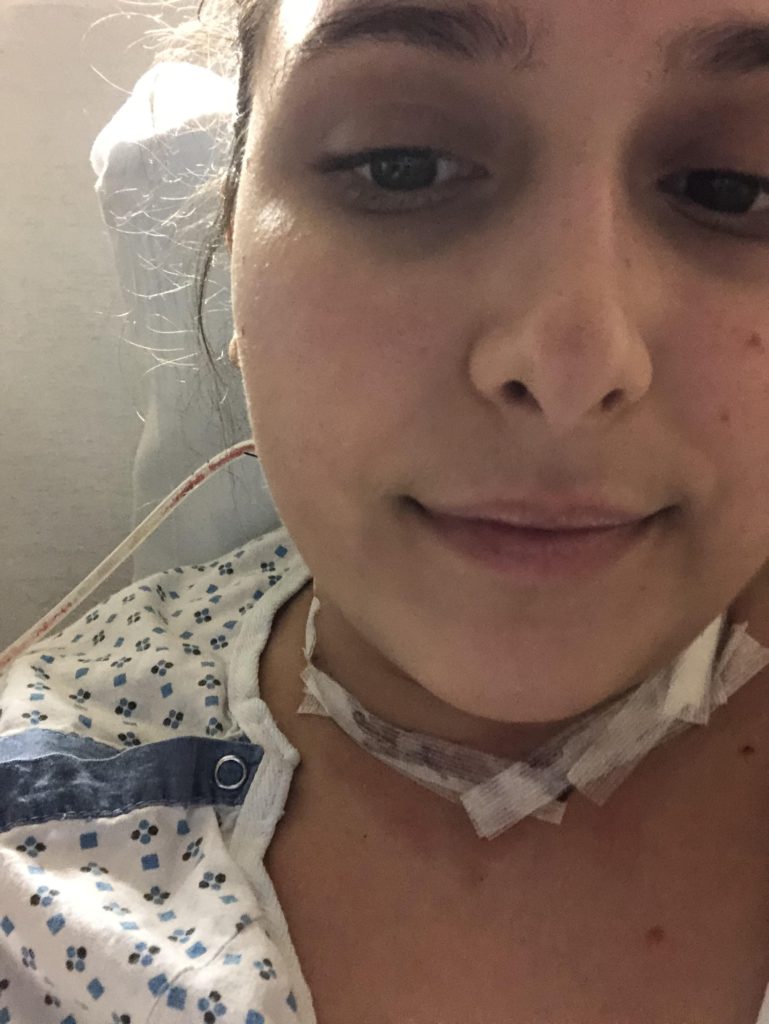
Surgery and Recovery
What testing do they do before the surgery
I had to get pre-testing done the next day to make sure you’re okay to get surgery. I had gotten an EKG and I had gotten a bunch of blood work done. They were like we want to confirm that you’re not pregnant. I’m like I would have told you if I was. I definitely know I’m not. But we can check it out anyway.
They check all your levels. I didn’t know what I was reading when they had given me my bloodwork results but they give you your EKG to make sure your heart’s okay, check any other levels like cholesterol, white blood cells, red blood cells.
Another “ironic” thing is the woman who had done my EKG was like, “Aside from the thyroid cancer you’re in pretty perfect health!”
I’m like, thanks, don’t need to be reminded. Clearly I’m not in perfect health, that’s why I’m here. But I know she was trying to make me feel better so nothing against her.
What happens with an EKG
Getting the EKG is just to check the rhythm of your heart. They take a few of those little sticky things and put them on various parts of your chest and belly, which is kind of comfortable because you have to lift up your shirt.
It takes about a minute and then they print out this paper to make sure everything is okay. Everything was in a good rhythmic pattern for me. I’ve gotten EKGs before so I knew what to expect. Thank god there’s nothing wrong with my heart, no irregular heartbeat. So I was pretty relieved when I got that sheet.
Very painless. Maybe the sticky things pinch a little bit when they come off but that’s it.
Describe the “drains” that would have to be put in your neck
He had mentioned that I was going to have to have drains put into my neck because of all the lymph nodes that were involved. You need the liquid drained from your neck because that liquid automatically goes into your lymph nodes. When your lymph nodes aren’t there, it’s going to back up into your neck. It can cause an infection and whatnot.
Describe the prep for the surgery
January 30 is when I got the pre-testing done and my surgery was on February 8. Going in for the surgery I was automatically annoyed because you can’t drink and you can’t eat. So the night before I made sure I had my favorite pizza and favorite food.
The next morning I woke up at 5am. My surgery was scheduled for 10am so I had to be at the hospital by 7:30 or 8am. To get from my house in Staten Island to Sloan Kettering with no traffic is about a half hour.
I went with a whole brigade of people. I had my sister, my boyfriend, parents, and my aunt. We all went to the hospital. Imagine my embarrassment walking in with this whole brigade of people behind me.
Checking in was a surreal feeling. Giving your name again, giving your birthday again, because they always have to get your name and birthday to make sure it’s you, medical procedures.
I walked in and they said okay, we’re going to go straight into pre-op. No waiting. I went straight in. You have to take off all your jewelry. You can keep your cell phone on you until you have to get wheeled in. They pretty much prep you for the IV that you’re going to get. They don’t give you the IV yet but get the port ready for it.
They get you that rocking hospital gown and the little comfy socks. You just chill and sit on the bed and answer nurse’s questions until it’s time for them to wheel you in.
I remember people were coming in and out because you can’t have too many people in pre-op with you at one time. My godfather had come all the way from the Jersey Shore to sit with my family while I was getting my operation. He would come in, then my dad would come in, it was a revolving door of people.
My doctor had surprised me and had left work to wish me good luck. I was getting a few phone calls. Then they had said to me we’re going to wheel you in in five minutes.
That’s when it was every emotion in that six weeks that I was bottling inside came crashing down.
I started hysterically crying. It was one of those things where I said to myself, I’m finally coming to terms with what’s happening to me and even though people are telling me thatI have the “good cancer,” I still have stage 2 cancer and I still have to get a major surgery done. I still have to get treatment and it’s going to be a long road to recovery. All those feelings hit me at once to where I’m sobbing uncontrollably.
I remember the nurse ran off to get Dr. Wong and he had come running down the hallway. He wasn’t in his scrubs or anything yet, he was in plain clothes. He sat at my pre-op bedside and held my hand. He calmed me down before I got wheeled into the operating room.
So I delayed my operation by five minutes because I had a little bit of a meltdown, but was reassuring me that everything was going to be okay. He was going to get everything he could visibly see. Just making me feel as comfortable as I could.
He said the next time I see you, you’re going to be awake and you’re going to be on the road to recovery.
So I felt okay and I had gotten wheeled into the OR (operating room). I remember looking behind me and seeing my mom, my sister, and my boyfriend waving, ‘See you later.’ Next thing I remember was just going straight into the operating room, sniffling a little, crying.
Everyone, all the nurses, and the anesthesiologist, were so sweet. Calming me down. Rubbing my hand. Telling me everything’s going to be okay. You’re about to have the best sleep of your life. Then they told me count backwards from ten. I got to eight and I went to sleep.
What are the results of your surgery
I had 86 lymph nodes taken out in addition to my thyroid, and a quarter of them came back cancerous. So the fact that we were able to get all of that out – not me, I was asleep – but Dr. Wong and team were able to get all of that out and have my tumor marker incredibly low before the iodine was just a miracle.
My endocrinologist had said it would be a miracle if my tumor markers came back under 100 because of all the metastases that I had. My tumor marker came back before the treatment at 4 which was amazing.
Waking up from surgery
By the time your anesthesia kicks in and the surgeon preps, it doesn’t start exactly at the time they say. I’d say my surgery started around 10:45 am and I woke up after 8 hours of surgery and about an hour and a half of recovery at 9 o’clock at night.
When I woke up, I heard this suctioning noise, maybe it was the oxygen or some kind of tube that was in my throat but I’m saying to myself in my head, wow, that really was the best sleep I ever had in my life!
I had woken up to see nurse Jill, who I had met a week or two ago at Dr. Wong’s office. I was so happy to see her. I felt this steri-strips around [my neck] and I was like, I don’t even want to know what this looks like.
I was told that I wasn’t going to have that little slit most people get when they get their thyroid out. I was told I was going to have the joker’s smile across my neck, cut ear from ear.
After that I remember my family coming in. I remember talking to my brother and sister-in-law on the phone and then I remember going up to my room and having a pretty painful first night.
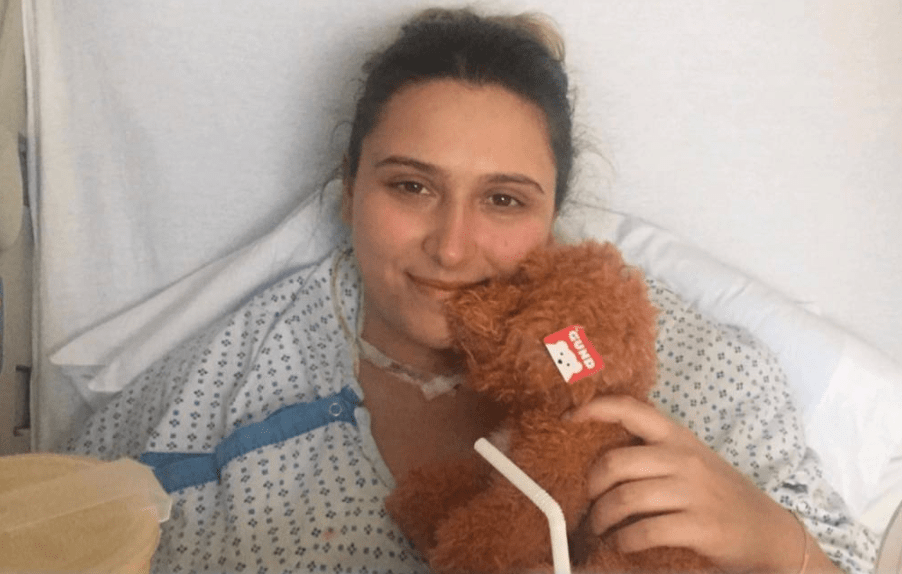
Describe the pain and physical adjustments during the immediate recovery
I was definitely still on the painkillers [when I woke up]. The one thing I had noticed immediately aside from the pressure on my neck from the steri-strips and from the incision was the catheter.
It wasn’t even a thought to me that I would have one put in. I’m not a very medically-savvy person so I’m like why do I feel so much pressure? Then I had seen what was going on. The first thing I said to the nurse was you have to take this out, I promise I can use the restroom by myself.
I had noticed that when I had gone up to use the restroom I forgot I had those drains in my neck. So I looked like Frankenstein. I had two bolts coming out of my neck and two drains that were little apples. I couldn’t move my neck because I just had an eight-hour operation and I have a huge twelve-inch incision on it.
The pain of trying to get up was the most excruciating pain I’ve ever had in my life. I’m not going to say it was a ten, it was more of an eight. But getting in and out of bed in the morning was like wow, I never want to go through an operation like this again.
You don’t think about it all the time but your neck is really important so when you can’t move properly and you’re coming out of anesthesia, it’s like so how do I move back and forth again? How do I get out of this bed? Do I slide down?
So it was a very fun first night! My mom stayed with me the entire time. Shocking, I know.
I wouldn’t take the highest pain meds that they were giving me. I’d like to think that I have a really high pain tolerance so they would offer morphine, I didn’t want it. They’d offer Percocet, I didn’t want it. They made me feel very loopy. I didn’t feel like myself.
At one point, it was probably from coming in and out of anesthesia and being on a painkiller but I could have sworn I saw one of the pictures on the walls moving. It was a picture of an elephant and I was like oh my gosh, the elephant’s charging at me!
So I was done with these, what else can you give me? They have extra-strength Tylenol so I said okay, that will work. I would say the pain was about a six or a seven. Nothing that I couldn’t handle.
When are you discharged from the hospital
I was at the hospital Thursday, Friday, Saturday, and I got discharged Sunday afternoon. The basis around getting discharged was the amount of output from the drains.
Thankfully I didn’t have a lot of output ever so on Sunday morning, Dr. Wong had come in to talk to me. He had come in previously, not just three days later, just to talk and whatnot.
He had looked at the drains and said good news, you get to go home today. Let’s get these drains out and let’s get you on your way.
»MORE: Mental and emotional support when leaving the hospital
Describe the drains and the removal
Mine was more of a cylinder and it’s connected with a tube into the cylinder. There’s a suction cup on each side you can prop open and empty the drainage. Thankfully I didn’t have to do that, the nurse did.
It’s all discharge. It’s not the most pleasant stuff coming out of your neck so try not to look at it too much. Try not to get upset, just know the drains are doing good. They’re taking out something that’s not supposed to be there.
You kind of have to hold them. You can tag them to you but don’t forget they’re there because they’ll pull down and you’ll be like that’s painful.
The drains, getting those removed, was the most painful part of it. You don’t realize how deep these tubes are into your neck. I had seen my mother, her face, when they were removing them. It was one of those things where it’s a never-ending string coming out of your neck.
By the time it actually came out I was like wow that is the most painful part of this entire thing, followed by the biopsy, then followed by the actual pain from the surgery. It felt so backwards but those drains – to anyone that ever has to get them put in – they’re not fun at all.
It was like having another pair of boobs, holding them up, for a lack of better words. Sorry if that’s inappropriate. I’m basically walking around and I want these things out! So when I actually got them taken out on Sunday I was super relieved because at that point I thought I was going to be in the hospital until Monday.
Anything you wish you had known about drains
Read whatever book or instruction sheet or fact sheet they give you about drains! It’s very uncomfortable but you have to remember that it’s temporary.
They’re going to come out. And remember you need them.
They make sure that everything is functioning properly. They avoid you getting an infection. They avoid that lymphatic liquid from building up in your neck so while you may feel very uncomfortable, just know they’re not just there for any reason. Your doctor knows what’s best. Just try to get through it.
How long did it take for you to physically recover
Don’t mean to be a buzzkill but I came home three and a half days later. They had sent me home with pain medication, the Percocet, etc. Me being too proud, the extra strength Tylenol is fine.
You can’t lay down right away. You have to sleep and sit reclined so that’s incredibly uncomfortable because who wants to sleep propped up in a chair like this all night when you can’t move your neck? You can’t tilt your head back because you have a fresh incision. You pretty much have to stay in place so I didn’t have a good night’s sleep for close to two and a half weeks.
I was sent home with instructions, little physical therapy guides from Dr. Wong’s office, to eventually do exercise with your neck, your face, move from side to side every day. You can do these funny things with your mouth because everything’s connected with nerves and muscles. Do the mouth exercises. Try to do these things three to four times a day.
I went back to work three-and-a-half weeks after surgery which was a big mistake on my part. At that point I wanted to get out of the house. I didn’t feel true job security. I’m a very independent person, I wanted to go back to work right away to make sure I still had a job to keep my independence and get back to my normal routine.
I had gone back to work after three-and-a-half weeks and I worked half-days because I didn’t want to tire myself. To really feel back on my feet again it took about a month because when you have your thyroid removed, you have to go on hormone replacement for the rest of your life to make up for all the hormone that you’re losing.
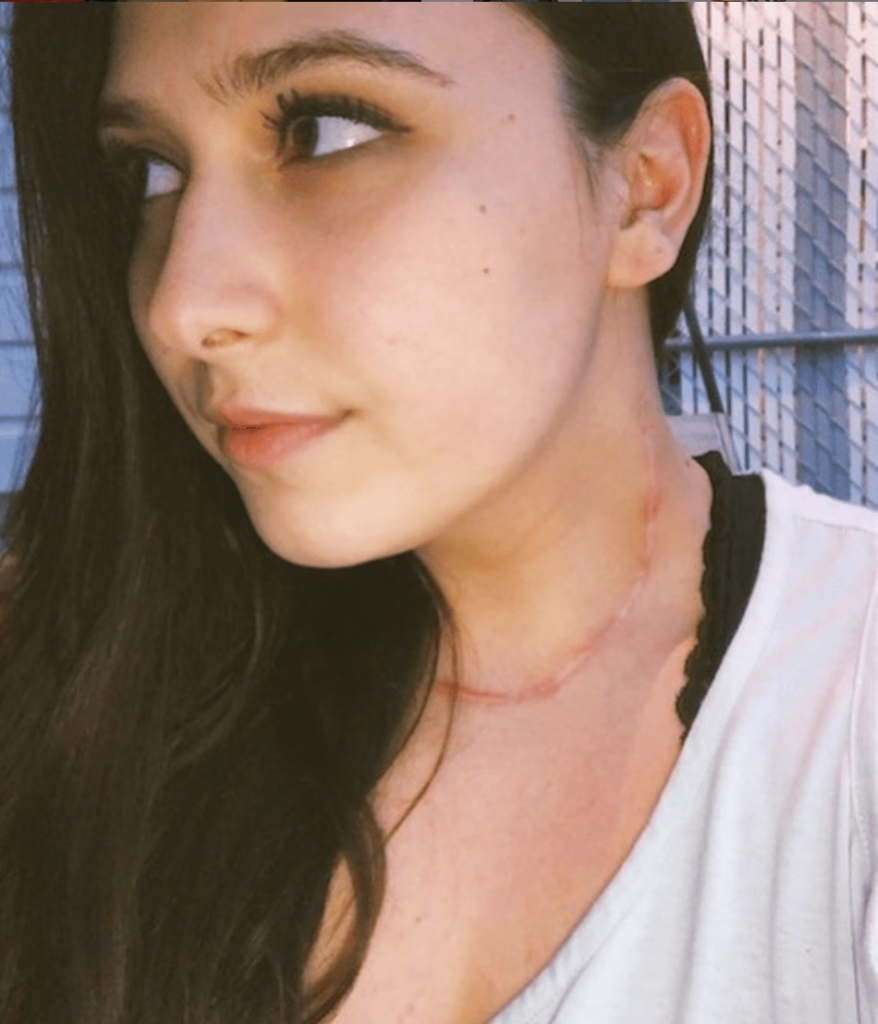
Synthroid (Hormone Replacement)
Describe taking the hormone replacement (Synthroid)
People don’t realize your thyroid basically controls everything in your body from your metabolism to your hormones to your weight.
Getting used to being on the Synthroid was a very big challenge that I still kind of face well past two years later. It’s not bad. But at the same time it’s just different. You’re on a medicine that’s meant to replace a gland that has so much control over your body and you have to stay on it for the rest of your life.
You have to take it as instructed. You have to take it every day in the morning, when you first wake up, with a full glass of water. You can’t eat or drink for an hour because you need the hormone to absorb in the body. So sometimes feeling my best is something that I still struggle with to this day.
Synthroid dosages can be hard to nail down
Unfortunately, for a lot of people like me, you can be on too much or too little thyroid hormone. For me I’ve been on too much. So I’m on my second new dose of Synthroid in about six months.
It’s kind of a game. My doctor at Sloan says it, too. We really have to find the perfect dose. Unfortunately, I haven’t found my perfect dose yet but I know I will because I have a great team.
I definitely prefer being on a “too light” of a dosage.
Being on too high of a dosage, you can get really bad palpitations. You can be very, very anxious. Shaky. It’s not a good feeling. Whereas when it’s too [low] you get really tired, you’re sluggish. Your weight is a big factor which unfortunately I’ve been struggling with since I’ve had my thyroid removed.
All temporary things. There’s going to be a solution, it’s not the end of the road. I have faith the next time I get blood work, my doctor’s going to know what to do.
Radioactive Iodine Therapy
What’s the overall radioactive iodine treatment plan
I had the radioactive iodine in May. It was a three-day process including the pre-hormone shots. They give (the shots) to you on your backside which is very fun. I had two. I had gotten the PET scan prior to the treatment, took the treatment, went home that Friday and then the Monday is when I had to go back for another scan. That was May 21.
They called me three days later to tell me that the treatment was 100% successful and that I was cancer free.
Describe radioactive iodine therapy in detail
The radioactive iodine therapy was basically my replacement of chemo. That was to make sure every leftover piece of thyroid cancer that is in my body got wiped out. Getting radioactive iodine is a very intricate process.
About nine days before you actually get the treatment done you have to go on this horrific, strict, low-iodine diet and you can’t have any salt. You can’t have any seasonings whatsoever. I couldn’t eat my favorite vegetables and I’m a vegetarian, so all I could eat was unsalted meat. Obviously I wasn’t going to eat that so I lived off of Thomas’ English muffins.
It’s three days of treatment technically because you have to get pre-hormone shots and you have to get scans before. You have to get scans after. Full PET scans.
They want to assess if there’s any visible tissue left. Thankfully, in my case, it was all microscopic and left in the thyroid bed. So I had no visible thyroid cancer cells in my chest, thank god, which had a lot of cancerous lymph nodes.
You’re starving because at this point you can’t eat a lot. You go in and it’s a surreal experience because you have a whole team come in with the iodine in this kryptonite box. When you turn it, it let out a steamy liquid thing. It was like a box inside of a box inside of a box which finally revealed this tiny little iodine pill.
You have to have a whole team watching you and you need to have a radiation specialist, with this little radiation tracker to make sure it went down all the way.
I had to be myself and I took the pill. I had said bottom’s up because I’m an awkward person and didn’t know what else to say! They checked to make sure it went fully into my stomach. You have to sit and drink a lot of water for about three or four hours. Then you get discharged but you have to stay away, be arm’s distance apart from people for about 48 hours.
You have to drink a lot of water because whatever iodine that didn’t uptake to the cancer cells you have to flush out. I remember I drank probably 25 bottles of water in two days. Very anticlimactic. Just swallowing a pill but still having to follow all of those guidelines.
Are there any side effects with the radioactive iodine pill
Thankfully, there are no major side effects.
It doesn’t mess with a female’s fertility. I would assume the same for a male. The one side effect that I was told that I couldn’t have is permanent dry mouth. They said it’ s very rare. It only happens in .1% of cases but just my luck, I have permanent dry mouth. But if that’s the worst that could happen, that’s okay.
Follow-Up Scans

How did you process the good news
Oh, I cried like a baby. I called everyone in my phone book. I called my grandma. First, I ran in the house to tell my family.
Really funny and quick, one of my best friends had saved my screenshot with my text that said, ‘I’m cancer-free.’ And she surprised me that New Year’s and had put that as one of her best moments from 2018 was getting that text message.
How many follow-up scans did you have to get
Because it is papillary thyroid cancer and it doesn’t grow as aggressively as other cancers in general, let alone other thyroid cancers, I haven’t had to get another PET scan.
Every six months I get an ultrasound of my neck because if the cancer was to recur, which I do have a moderate chance of recurrence, it would recur in a lymph node.
Thankfully, it’s so slow growing that it wouldn’t get as out of control as it was at first.
Every six months for ultrasound, every six months to check my tumor markers (blood test), every three months to check my thyroid function (blood test). Thankfully it’s just one tube of blood, not too crazy.
Sloan is great and they upload your results pretty quickly on your portal. So I’m checking my levels on the subway back to work.
Mental and Emotional Impacts of Cancer
“Good cancer” guilt
So you feel so guilty because you have cancer but you don’t have a severe form of cancer like someone that god forbid has lymphoma, breast cancer, leukemia where you know they have to go through chemo and take such a toll on their bodies. They’re still in the room with you and they’re smiling.
That gave me a sense of guilt. How could you be so upset when there’s people around you that have it so much worse than you kind of thing. That’s not a good mindset to have all the time.
The thing about having the ‘good cancer’ is that you’re automatically shamed because most of the time, especially with my thyroid cancer, with papillary thyroid cancer, you don’t need chemo.
That’s a major part of most cancer patients’ lives. You automatically feel guilty because you’re like why am I crying? I’m not going to have to go through something like this. I’m not going to lose my hair. You feel terrible about complaining. I always have that mindset – there’s always someone that has a tougher time than you.
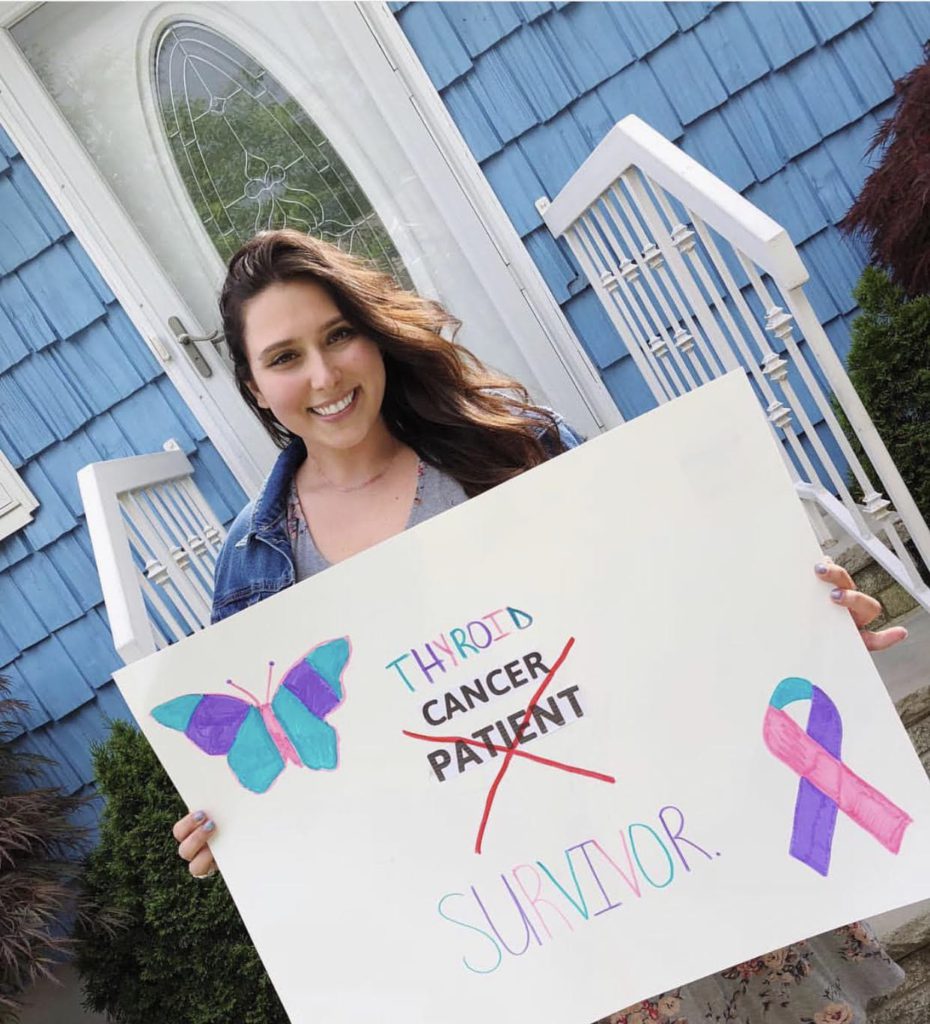
But then at the same time, you don’t give yourself enough leeway. You’re still sick. You’re still going to a cancer center. You’re still getting a surgery. I went from never having a surgery to having an eight-hour surgery and a 12-inch incision on my neck.
Your life, it does get changed. Maybe I didn’t have chemo but I still went through hell.
People really underplay what an important function your thyroid plays. Before I had the cancer, I just knew the thyroid is shaped like a butterfly and it’s in your neck, and my mom’s is bad so she has to be on medicine for it. But its’ so much more than that. It’s such a big part of you.
You expect a tiny little pill that you have to take everyday, you’re expecting that to do everything for your body that your thyroid did. Being on Synthroid is like a constant roller coaster because after two years, I still feel like I’m not on the right dosage. That’s something my team at Sloan works with me on constantly.
You’re going to be okay in the long run but you have to work to be okay. You have to have a strong mindset and you have to get used to this new life.
At the same time, you need to be thankful that you have your life. As complicated as that sounds, you just have to be strong. You just have to remember that the comeback is always going to be greater than the setback.
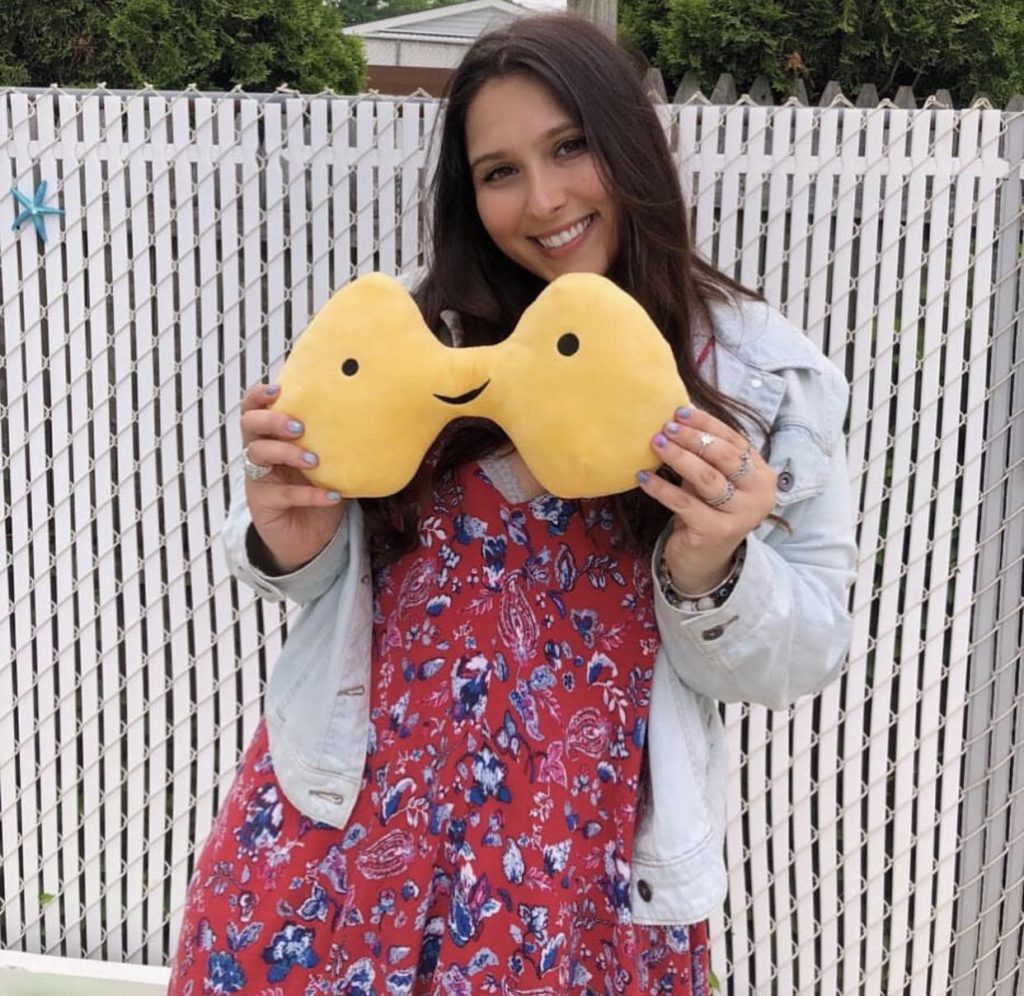
Being a young cancer patient
We sat in the office and freaked me out initially, what still makes me a little uneasy sometimes, is that I’m always the youngest person in the office.
I’m not that young. I’m 26 years old, but there’s such a stigma around cancer sometimes that you’re older and you’re middle-aged. It was odd being the only younger person in the room. That immediately made me feel a little uneasy.
Anything last advice to people dealing with a (thyroid) cancer diagnosis
Your mental recovery and the recovery of your spirit is a completely different ballgame than your physical recovery. You need to take time for both.
You need to nurture yourself, take care of yourself mentally, just as much as you would physically. For me, it wasn’t just and it’s still not just living with a 12-inch incision in my neck and a scar.
It’s adjusting to a new life and trying to find people that have been through the same thing as you. Whatever mental health resources that you can get definitely take advantage of them. There’s no shame in asking for help. Just knowing that you’re not alone.
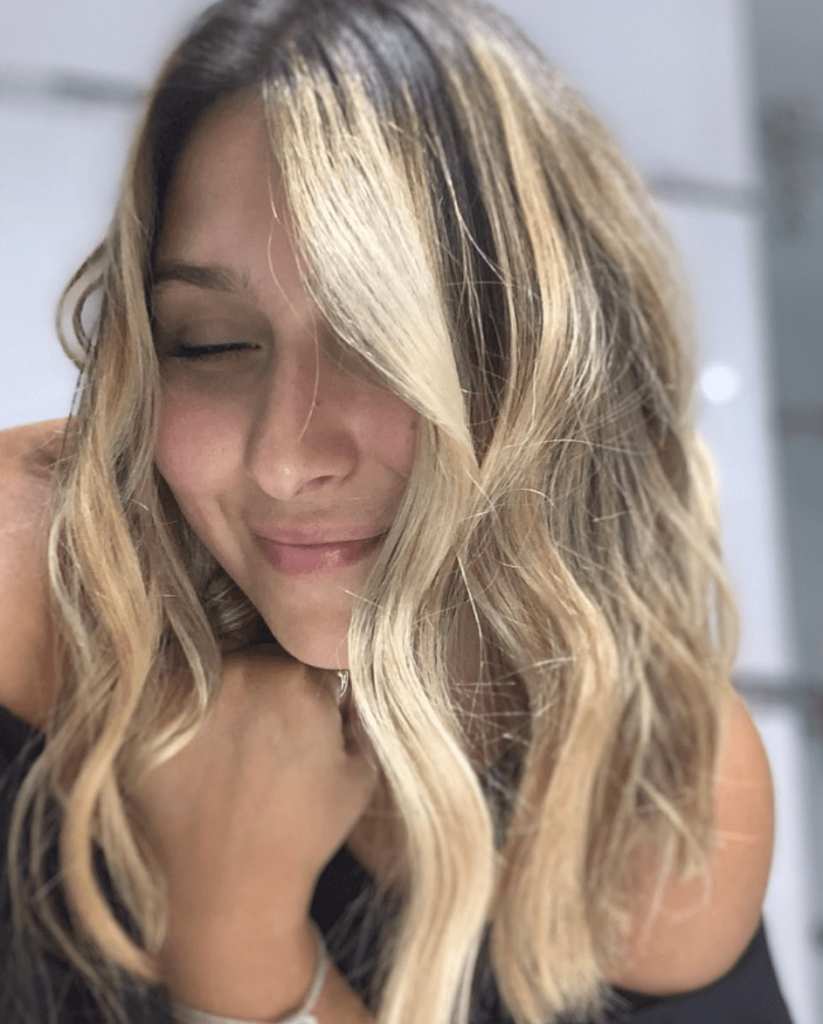
Inspired by Jenna's story?
Share your story, too!
Thyroid Cancer Stories (Under 55 Years Old)
Cyndi F., Thyroid Cancer (Papillary Thyroid Carcinoma), Stage 1
Symptoms: None per se, nodules discovered during thyroid examination
Treatments: Surgeries: hemithyroidectomy, isthmusectomy, mid-neck dissection, parathyroid transplant
...
Laura C., Follicular Lymphoma, Stage 4 (Metastatic), Grade 1 to 2; Papillary Thyroid Carcinoma
Symptoms:Incidental finding after hysterectomy (follicular lymphoma), thyroid nodule detected on imaging (papillary thyroid carcinoma)
Treatments: Immunotherapy (rituximab and lenalidomide or R² regimen), surgery (thyroidectomy)
...
Alyse V., Thyroid Cancer (Papillary Thyroid Carcinoma, Tall Cell Variant, Metastatic)
Symptoms: None per se, lump discovered during thyroid examination
Treatments: Surgeries (neck dissection, lymphadenectomy), integrative therapies
...
Valerie V., Thyroid Cancer (Papillary Thyroid Carcinoma), Stage 4 (Metastatic)
Warning Signs: Bruising, extreme fatigue, cold intolerance, weight loss
Treatments: Surgeries (total thyroidectomy, neck dissection, lymphadenectomy), radiation therapy (radioactive iodine therapy), hormone therapy (thyroid hormone suppression therapy)
...
